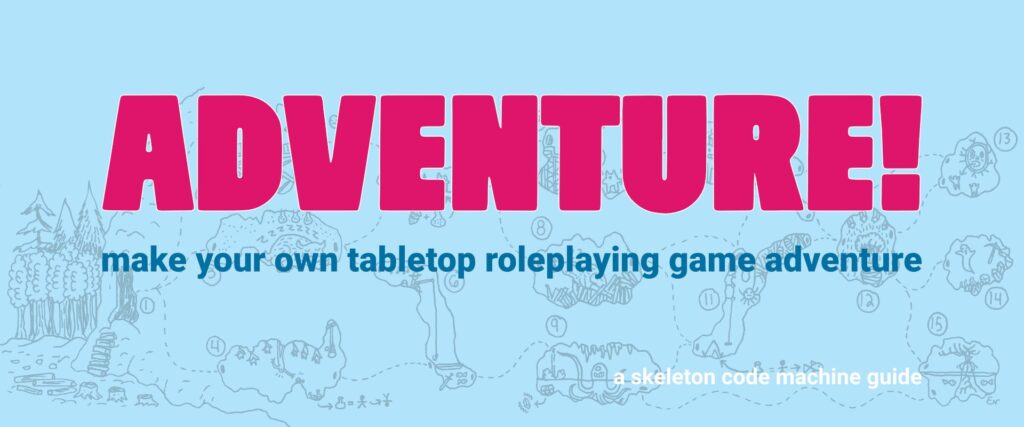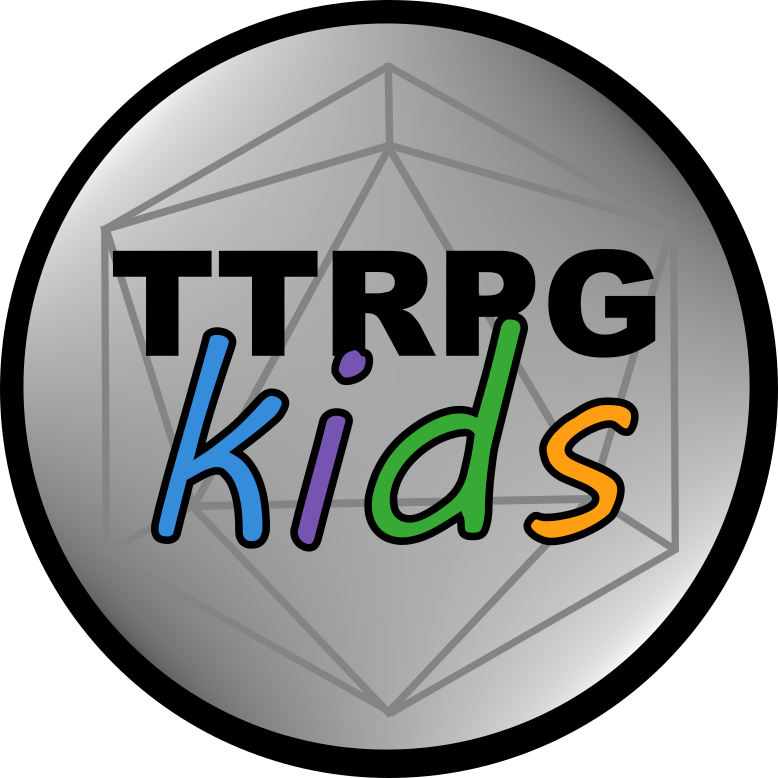Interview with John from Skeleton Code Machine/Exeunt Press – supporting creators, libraries, and the general community
In this interview, John shares his XP with self-publishing and talks about his creators guides, supporting your local libraries, and how you can kick off your first publication!
The following is a write-in interview conducted between John (the interviewee) and Steph Campbell from TTRPGkids (the interviewer). This interview is posted with permission from the interviewee.
What’s your backstory (i.e. what cool stuff do you do/what have you worked on)?
I had an uncle that introduced me to the classic Avalon Hill wargames and Dungeons & Dragons at an early age. Playing those games with him and my dad created a love of tabletop gaming that has lasted a lifetime. Although I didn’t game as much through high school, after college I started again when I discovered games like Catan and Carcassonne and never stopped.
My background is in engineering and manufacturing, which has been surprisingly helpful when making games. Technical writing and project management skills are incredibly useful. I often joke that I’ve honed my layout and design skills with years of PowerPoint slides.
What is Exeunt Press and Skeleton Code Machine? And how did you start doing these?
Exeunt Press is an independent tabletop game design company creating games that blend storytelling with structured mechanisms. It has one employee (me) and one unpaid intern (my dog). Skeleton Code Machine is an ENNIE-nominated weekly game design newsletter that I publish.
My first published game was a one-page TTRPG called Mammoth, created for the Tiny Tome Jam in December 2021. I was shocked when it ended up being selected for inclusion in the print book!
Since then, I’ve been hooked on the idea of blending ideas from board games and TTRPGs, usually in a weird, slightly-horror setting. Exclusion Zone Botanist earned an ENNIE-nomination in 2023 and provided a big boost both in visibility and confidence.

It’s still hard to believe Exeunt Press is a “real business” now with distribution around the world.
How do your articles and publications assist indie creators?
I believe the act of creating art and games is inherently good, and I want to lower the barriers for people to try it. My goal is to both inspire new game designers and make the whole process more approachable.
For example, my Skeleton Code Machine series on public domain art helps new creators find free, high-quality artwork — removing a huge barrier for designers making their first game. The Make Your Own One-Page RPG guide does something similar, breaking down an intimidating process into small, doable steps with exercises and encouragement.
Last year I launched Tumulus, a quarterly print zine of design theory, creative inspiration, and playable content that blurs the line between board games and TTRPGs.
Most recently, I released ADVENTURE! Make Your Own TTRPG Adventure. It deconstructs MÖRK BORG’s Rotblack Sludge and uses it as a framework to help designers make their own adventures.

Whether it’s releasing a free CMYK color palette or an article on layers of theme, I want to inspire indie creators and give them tools and confidence to make their own games.
What kind of talks have you done at libraries and how do you think they help the community?
I’ve taught multi-sessions classes at public libraries, including an “Introduction to Tabletop Game Design” course that won the 2024 Best Adult Program in Basic Literacy from the Pennsylvania Library Association. It was based on topics covered at Skeleton Code Machine like the different kinds of fun, player agency, theme vs. mechanism, and core game loops.
Recently, I taught a “Make Your Own One-Page RPG” workshop (based on the book) where participants created and published their own games. It was so exciting to see new game designers sharing their creations!

Coming in 2026, I have one-day classes scheduled in Baltimore and Gettysburg.
For me, teaching game design classes is one small way I can support public libraries. Free programs support literacy, creativity, and social-emotional learning (SEL) goals. They expand the library’s programming and reach. They benefit the community by fostering connections via game-making, play, and creativity.
What advice do you have for folks who are looking to publish their first TTRPG and what are some of your top resources that they should check?
Make stuff. Share it with others. Don’t worry if it is “good enough” or not.
Start small. Try making a one-page game. Limitations foster creativity.
Participate in game jams and events like MÖRKTOBER. Having a deadline is a powerful motivator.
And at the risk of crass self-promotion, I really do think the Make Your Own One-Page RPG guide is a great introduction to making your first TTRPG. To ensure it’s accessible to everyone, you can read it for free online. It’s also available as a nicely formatted PDF or in print.
Any final shoutouts, thoughts, or advice? Is there anything we missed talking about that you’d like to cover?
First, make weird games! Join the One-Page RPG Jam each summer. See if Unpub or Break My Game are running events in your area and participate when you can.
Second, if you have some game design knowledge, talk to your local public library! My experience has been that they are always looking for new programs to run. It’s a great way to meet local designers, help others create games, and support your community.
If you want to find out what I’m working on next, Exeunt Omnes is the best place to do that. And you should follow the Exclusion Zone Botanist: Epsilon pre-launch page on Kickstarter!
Finally, I’d like to thank everyone at the ATOPIA Discord server, especially Hinokodo (creator of MIRU) for running it. It’s been a very welcoming, friendly, and supportive design community.
Thank you John for sharing your knowledge with us! It’s been nice to connect with another blogger in the TTRPG space, and I’m really excited to see the community resources and support you’re creating, in addition to your own games. I appreciate your taking the time to chat!
And… if you liked this post, make sure to subscribe to the TTRPGkids monthly newsletter to stay up to date on the latest reviews, tips and tricks, game and podcast list updates, and more! Thank you for playing tabletop RPGs with your kids and sharing this awesome hobby with the next generation!



